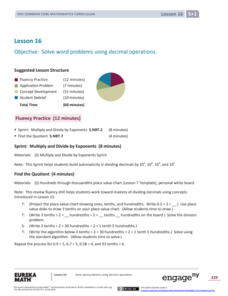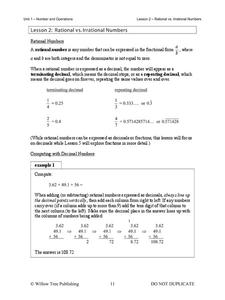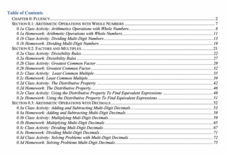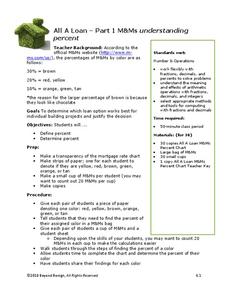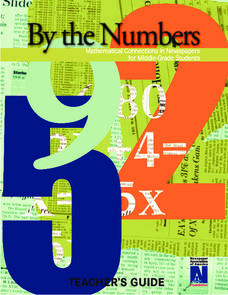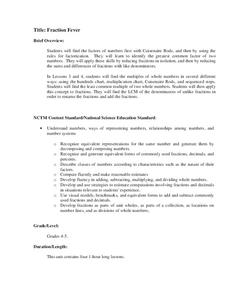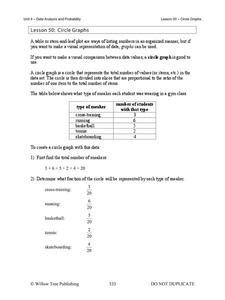EngageNY
The Distributive Property and the Products of Decimals
Make multiplication of decimals easier by applying the distributive property. Pupils investigate how they can use the distributive property to multiply decimals. After learning the strategy, they work on some practice problems at...
EngageNY
Grade 5 Math Module 1, Topic A, Lesson 1
Extend the place value system. The first lesson plan in a series of 18 extends the place value system to millions through thousandths. Using place value charts, pupils see how the value of a digit changes as it moves places. Teachers use...
EngageNY
Grade 5 Math Module 1, Topic E, Lesson 11
Let your understanding of multiplying decimals flourish and multiply. After briefly reviewing place value concepts and how to add and subtract decimals, scholars learn to multiply a decimal fraction (like 0.6) by a whole number. They use...
EngageNY
Grade 5 Math Module 1, Topic E, Lesson 12
Continuing from the previous instructional activity, scholars work on mastering the skill of multiplying decimal fractions by a whole number. The method employed in the instructional activity is to convert the decimal fraction to its...
EngageNY
The Division Algorithm—Converting Decimal Division into Whole Number Division Using Fractions
Knowing the standard algorithm opens up a whole new world of division. Scholars learn how to convert division involving decimals to division involving whole numbers to use the standard algorithm. Knowing how to multiply with powers of...
EngageNY
Grade 5 Math Module 1, Topic F, Lesson 16
See, decimal operations do come in handy! Pupils solve word problems that require adding, subtracting, multiplying, and dividing decimals. They use tape diagrams to express relationships and to identify the necessary operations to solve...
EngageNY
The Division Algorithm—Converting Decimal Division into Whole Number Division Using Mental Math
Make math much simpler with mental math methods. The 16th installment in a series of 21 looks at ways scholars can apply mental math to convert division problems into easier problems with the same quotient. Multiplying or dividing both...
EngageNY
Grade 5 Math Module 1, Topic F, Lesson 13
After completing a fluency practice set on subtracting, multiplying, and comparing decimals, pupils begin learning about dividing decimals by whole numbers. They see how to use place value reasoning to find compatible numbers for...
Federal Reserve Bank
Financial Fables: Shopping Wisely with Olivia Owl
Cover two subjects with one lesson! First, dive into English language arts; read an eBook, answer comprehension questions, and complete a cause and effect chart about the financial fable, Shopping Wisely with Olivia Owl. Then, take...
Scholastic
Study Jams! Decimal, Fraction, & Percent Equivalents
If percents, fractions, and decimals can all mean the same number how do we go from one to another? During this instructional activity, watch how it goes over the basic steps needed to go from one rational number to the next. Both...
Benjamin Franklin High School
Saxon Math: Algebra 2 (Section 1)
This first of twelve algebra 2 resources provides a broad review of many algebra 1 concepts through a number of separable lessons and labs. Starting with the real number system and its subsystems, the sections quickly but thoroughly...
Willow Tree
Rational vs. Irrational Numbers
Build an understanding of rational numbers and their counterpart irrational numbers. Lead learners through an explanation of rational numbers and the ways they can be expressed. Then introduce them to irrational numbers and make...
Utah Education Network (UEN)
Fluency
Become fluent in the language of mathematics. Scholars learn to divide multi-digit whole numbers as well as see how to determine the greatest common factor and least common multiple. They also investigate how to apply the distributive...
Beyond Benign
All A Loan
When designing a house, it's important to know about percents. Through a series of three lessons, scholars first review percentages through an activity involving M&Ms and then apply that knowledge to calculate compound interest and...
Arizona Department of Education
Area and Perimeter of Regular and Irregular Polygons
Extend young mathematicians' understanding of area with a geometry lesson on trapezoids. Building on their prior knowledge of rectangles and triangles, students learn how to calculate the area of trapezoids and other...
EngageNY
Exponents
Powered up! Here's a great resource on exponents. Scholars build on their previous understanding of exponents to include all positive real number bases. Distinguishing between an and a^n is a major goal in the fifth lesson of a 36-part...
Houghton Mifflin Harcourt
Simple and Compound Interest
Your learners will get lots of practice calculating simple and compound interest by the end of this lesson. Simple explanations and examples lead learners through the concepts and steps of calculating simple and compound interest...
Newspaper Association of America
By the Numbers: Mathematical Connections in Newspapers for Middle-Grade Students
A cross-curricular resource teaches and reinforces mathematical concepts with several activities that use parts of a newspaper. Scholars use scavenger hunts to find the different ways math is used in the paper along with using data...
EngageNY
Estimating Digits in a Quotient
Boiling down any division problem to a one-digit divisor problem sure makes estimation easy. The lesson shows how to estimate division problems by using place value understanding and basic arithmetic facts to simplify the division. Some...
Mathematics Vision Project
Quadratic Equations
Through a variety of physical and theoretical situations, learners are led through the development of some of the deepest concepts in high school mathematics. Complex numbers, the fundamental theorem of algebra and rational exponents...
National Security Agency
Fraction Fever
This unit on fractions allows for upper-aged elementary learners to explore ways to find the greatest common factor and least common multiple of two numbers. Ultimately, young mathematicians will be able to identify equivalent fractions,...
West Contra Costa Unified School District
Solving Rational Equations
Scholars first learn to solve two-step equations with fractional coefficients and constants by traditional methods and by clearing the denominator. They continue by learning another approach to solve two-step equations that have decimal...
Willow Tree
Circle Graphs
Pie isn't just for eating! Scholars learn to create pie charts and circle graphs to represent data. Given raw data, learners determine the percent of the whole for each category and then figure out the degree of the circle that percent...





